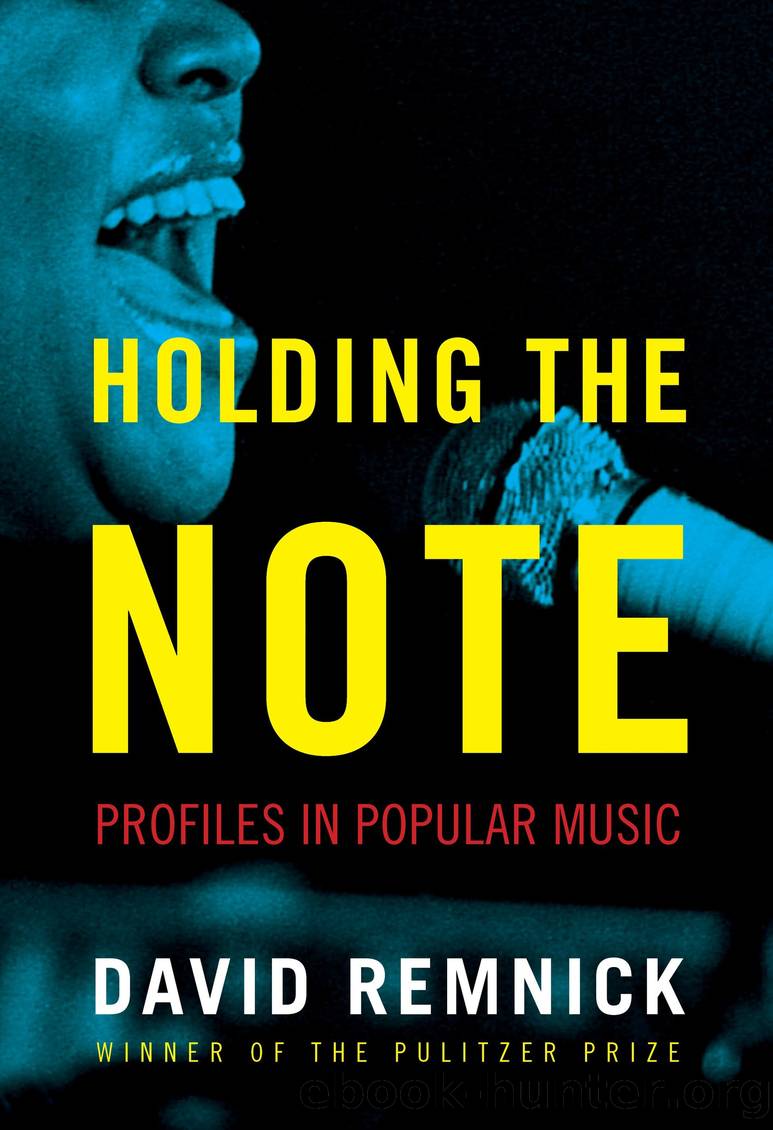Holding the Note by David Remnick

Author:David Remnick [Remnick, David]
Language: eng
Format: epub
Publisher: Knopf Doubleday Publishing Group
Published: 2023-05-23T00:00:00+00:00
* * *
Backstage at Wolf Trap, Staples and her band prepared for the show as they often do, by singing a gospel tune, âWonderful Savior.â Sometimes, particularly in the South, Staples might get a crowd that is racially mixed, but not often. Itâs been a long time since she could measure her performance by the number of shouts and âamenâs from an audience; no one at Wolf Trap was likely to require a deacon to fan them back into consciousness. Those gospel theatrics and emotions belong to a different world. And modern gospelâwhether it is Kirk Franklinâs hip-hop-inflected music or the vast number of choirs in churches across the country or Kanye Westâs Sunday Service Choirâis not a presence for most of these listeners. All the same, Staples will sometimes have her guitar player, Rick Holmstrom, sneak a look at the audience. âI can sense a difference in her when we get an amen corner with even some pockets of African Americansâit changes the vibe,â he told me. âIâll peek, and sheâll say, âHow does it look? Slim and his brother None?â Iâll say, âI donât think itâs a âWeightâ night.â That means thereâs some Black folks. We can lean on soul and gospel. A âWeightâ night would be when itâs a white crowd.â
The Staple Singers, like their leading Black brethren in the blues, have always had a reverent audience of white musicians. One of the first singles the Rolling Stones recorded was âThe Last Time,â a hit in 1965, which is credited to Mick Jagger and Keith Richards but was inspired by a Staple Singers recording from a decade before. Pops Staples didnât mind; the tune is from a traditional gospel song. Then the Stonesâ management asked the Staple Singers to open for them on their 1972 tour. By now, Pops had shifted the group into more popular material. Singles like âIâll Take You Thereâ might have displeased some gospel purists, but they widened the groupâs appeal and made them wealthy. No matter. The Stones offered the Staple Singers a paltry five hundred dollars a night. Pops turned them down. âIâd like to think Mick Jagger doesnât know about this,â he told a reporter for Variety.
Mavis Staples has no patience for segregation, in politics or in music. She is at once sure-minded about the essential place of Black composers and performers in American music and open to singing with anyone who can keep up. Over and over in recent years, she has been a presence in that gumbo genre known as Americana. Among her albums in that vein is a sentimental one called Carry Me Home, recordings that she did in 2011 with Levon Helm, at his barn in Woodstock. Helm, who died in 2012, was suffering from throat cancer; he was terribly thin, his voice raspy and weak, and yet together they rise to the occasion, collaborating on Curtis Mayfieldâs protest anthem âThis Is My Country,â Dylanâs gospel song âGotta Serve Somebody,â âThe Weight,â and, yes, âThis May Be the Last Time.
Download
This site does not store any files on its server. We only index and link to content provided by other sites. Please contact the content providers to delete copyright contents if any and email us, we'll remove relevant links or contents immediately.
The Goal (Off-Campus #4) by Elle Kennedy(13674)
Kathy Andrews Collection by Kathy Andrews(11834)
Diary of a Player by Brad Paisley(7581)
Assassin’s Fate by Robin Hobb(6222)
What Does This Button Do? by Bruce Dickinson(6207)
Big Little Lies by Liane Moriarty(5804)
Altered Sensations by David Pantalony(5105)
Pale Blue Dot by Carl Sagan(5008)
Sticky Fingers by Joe Hagan(4199)
The Death of the Heart by Elizabeth Bowen(3622)
The Heroin Diaries by Nikki Sixx(3550)
Confessions of a Video Vixen by Karrine Steffans(3309)
Beneath These Shadows by Meghan March(3308)
How Music Works by David Byrne(3271)
The Help by Kathryn Stockett(3150)
Jam by Jam (epub)(3093)
Harry Potter 4 - Harry Potter and The Goblet of Fire by J.K.Rowling(3074)
Computational Linguistics and Intelligent Text Processing: 20th International Conference, CICLing 2019 La Rochelle, France, April 7â13, 2019 Revised Selected Papers, Part I by Alexander Gelbukh(2995)
Strange Fascination: David Bowie: The Definitive Story by David Buckley(2872)
